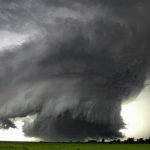We run our website the way we wished the whole internet worked: we provide high quality original content with no ads. We are funded solely by your direct support. Please consider supporting this project.
If every effect has a cause, how can there be free choice?
The most common argument given in defense of determinism is that it’s implied in the nature of causation. Every event has a cause, and this cause accounts for the event being the way it is. This cause must itself have had a cause that accounts for it, and so on ad infinitum. Hence, everything must have been predetermined from the beginning (if there was a beginning), and so there is no room for freedom or spontaneity.
Now, I don’t think anyone can dispute the claim that every contingent event must have a cause. The idea of a completely uncaused contingent event is absurd. (Notice, I say every contingent event must have a cause, since I see nothing unintelligible in the concept of a necessary being, such as God, being uncaused. That’s what it means to be necessary, in contrast to being contingent). What is disputable, however, is the claim that every cause necessitates one, and only one, effect.
It’s one thing to say, (a) “ X is the cause of Y,” and another thing to say that (b) “Given X, Y had to happen” and/or (c) “Given X, only Y could happen.” There is no good reason to assume (b) and (c) are universally true. This is nothing more than a philosophical dogma. It is, in fact, the dogma of determinism.
The fact is that, as David Hume argued centuries ago, we don’t even know what a “cause” is. It is simply a word we use to say “When we observe X, we observe Y after it.” But there’s nothing in the nature of causation itself that says Y must always follow X. So there’s no basis for the assumption that “Given X, Y had to happen, and only Y could happen.”
If we look at the world as a work of art instead of a deterministic mechanism – as western science up until recently has been imagining it – we can see this more clearly. Imagine that we are all artists invited to paint a segment of a grand mosaic, and we paint with our free decisions. Now let’s think about causation in this context.
Imagine Van Gogh’s famous hallucinogenic painting, “Starry Night.” We’d all agree that every riveting detail of this work is explainable by referencing the aesthetic vision that was inspiring Van Gogh to paint this painting. Nothing in the painting is capricious (that is, without a cause). Yet, can’t we imagine a slightly different painting being explainable by referencing this same aesthetic vision?
If the church steeple in the painting had been a centimeter taller or shorter, for example, would it alter the aesthetic achievement of the painting? If it had been a centimeter to the left or right, would it have been inconsistent with the vision that was behind this painting? If one particular stroke of yellow or purple or black had been a centimeter longer or shorter, couldn’t we explain it by appealing to the same aesthetic vision we would appeal to now to explain the shades that are presently in the painting? And so for a trillion other details in this painting.
My point is that a given cause can explain more effects than one, as artist works illustrate. But our own free decisions reveal this as well. So do quantum particles. And so does every aspect of creation! There’s causation everywhere, but there’s also an element (however slight) of spontaneity everywhere.
This dance of order and freedom, structure and spontaneity, is what makes the creation beautiful and an adventure.
So, determinism rests on an unwarranted assumption about causation. It runs against our experience of free decision making, of creating works of art and many other things. And it’s inconsistent with some recent advances in science (as my forthcoming book The Cosmic Dance will attempt to prove). Every effect does have a cause, but its not that case that given that cause, the effect had to follow.
Category: General
Tags: Free Will, Predestination
Related Reading

Isn’t the World Unsafe If God Doesn’t Control Everything?
If God isn’t in control of everything, the world feels unsafe. If the future is open and if things can happen outside of God’s will, what guarantee is there that there is a point to a person’s suffering? Maybe it’s all just bad luck. My experience has been that many of those who honestly examine…

Podcast: If Our Names Have Been in the Book of Life Since Before Creation, Are We Still Free?
Greg considers the documentation habits of the Lord. http://traffic.libsyn.com/askgregboyd/Episode_0382.mp3

The Risk of Love
The most basic and yet most profound teaching of the Bible is that “God is love” (1 Jn 4:8; 16). He is revealed to be a God who is triune—Father, Son and Holy Spirit (See Mt 3:16; 28:19, Jn 14:26; 15:26)—who’s very essence is an eternal, loving relationship. He created the world out of love…

God’s Love and Your Freedom
The most distinctive aspect of the revelation of God in Christ is Jesus’ demonstration that God relies on love to defeat his enemies and to accomplish his purposes. More than anything else, it was the perfect love of God revealed in the incarnation, ministry, and self-sacrificial death of Jesus that in principle defeated evil and…

How Can Salvation by Grace Involve Free Will?
How does salvation by grace work if people have free will? If salvation hinges on whether individuals choose to be saved or not, is salvation based on grace or works? If we have to choose for or against God, then doesn’t the credit for our salvation ultimately go to us? Along the same lines, doesn’t…

Why Does God’s Activity Seem So Arbitrary?
Why? It’s the question that never goes away. Why is one infant born sickly and deformed when at the same time another is born perfectly healthy? Why does tragedy repeatedly strike one family while another seems to enjoy uninterrupted peace? On and on we could go with examples. It all seems so arbitrary and unfair.…
